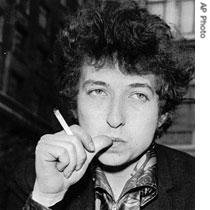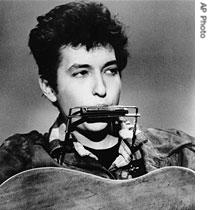-
(单词翻译:双击或拖选)
In the ‘60s he was a wildly popular folk singer. But his musical journey took him beyond the music his fans expected him to play. First of two parts. Transcript1 of radio broadcast:
08 June 2008
VOICE ONE:
Welcome to THIS IS AMERICA in VOA Special English. I'm Steve Ember.
VOICE TWO:
And I'm Barbara Klein. Today we have the first of two programs about one of America's greatest musical and lyrical minds. This singer and songwriter recently won a special Pulitzer Prize. The prize committee said works of "extraordinary poetic2 power" mark his influence on popular music and American culture.
VOICE ONE:
 |
| 1965: Singer Bob Dylan in London |
The artist is Bob Dylan.
(MUSIC)
VOICE TWO:
The nineteen sixties were a time of great social change. Bob Dylan was called the voice of his generation. Yet he rejected that idea, and his musical journey has taken him beyond the music his fans expected him to play.
His most recent album, "Modern Times," was released in two thousand six. It became his first number one album in thirty years.
(MUSIC)
VOICE ONE:
Bob Dylan was born Robert Allen Zimmerman. He was born on May twenty-fourth, nineteen forty-one, in Duluth, Minnesota, in the Midwest. When he was young, his father became sick with polio. As a result, his family moved to the small town of Hibbing, Minnesota. His family was part of a small Jewish community there.
In high school, the young Robert Zimmerman started his own musical groups. These included the Shadow Blasters and the Golden Chords. He played popular rock and roll songs. He especially liked the music of Little Richard.
VOICE TWO:
In nineteen fifty-nine, he went to Minneapolis to attend the University of Minnesota. He left college after one year, but in Minneapolis he became interested in folk music. Here is a recording3 of him from nineteen sixty, playing a version of the folk song "Rambler, Gambler."
(MUSIC)
It was also in Minneapolis that he started calling himself Bob Dylan. In his book "Chronicles" he writes that he wanted to call himself Robert Allyn. But then he saw some poems by the Welsh poet Dylan Thomas, and that settled it.
VOICE ONE:
 |
| Folk singer and songwriter Bob Dylan plays the harmonica and acoustic4 guitar in March 1963 at an unknown U.S. location |
He also changed the direction of his life. In nineteen sixty-one he moved to New York City. One of the reasons he went was to visit the biggest musical influence on his young career. The folk singer Woody Guthrie was slowly dying of Huntington's disease at a hospital in New Jersey5.
Bob Dylan visited him many times and later wrote a song about him. Here is "Song to Woody."
(MUSIC)
VOICE TWO:
The artistic6 life of New York provided a rich musical education that the young Bob Dylan could not have received anywhere else. Much of it came from listening to folk performers in the Greenwich Village area of the city.
He had an excellent memory. He remembered people, and ways of playing the guitar. He played in bars and clubs, and became part of a loose community of performers. They shared traditional songs and added their own touches to create a living art form.
In less than a year, Bob Dylan was offered a recording contract by John Hammond of Columbia Records. His first album, in nineteen sixty-two, was simply called "Bob Dylan." Mostly it was songs he had learned.
(MUSIC)
VOICE ONE:
Also in nineteen sixty-two, Robert Zimmerman officially changed his name to Robert Dylan. Bob is short for Robert. The following year, he released his second album, called "The Freewheelin' Bob Dylan."
This time, he wrote most of the songs himself. One was a song about his girlfriend at the time, Suze Rotolo, called "Don't Think Twice, It's All Right."
(MUSIC)
VOICE TWO:
Another song offered powerful words as social unrest grew in America in the nineteen sixties. The sixties brought major civil-rights legislation for blacks, and protests against American expansion of the war in Vietnam.
The group Peter, Paul and Mary had an international hit when they recorded their own version of Bob Dylan's "Blowin' in the Wind."
(MUSIC)
VOICE ONE:
In the next few years, Bob Dylan entered a period of intense creativity. Some of his songs were topical. For example, his third album included a song based on a true story, the killing7 of a black worker by a white tobacco farmer.
The album, released in January of nineteen sixty-four, was called "The Times They Are A-Changin'." The song was "The Lonesome Death of Hattie Carroll."
(MUSIC)
VOICE TWO:
Bob Dylan performed with folk singer Joan Baez at the nineteen sixty-three March on Washington. That was the big civil-rights demonstration8 where Martin Luther King Junior gave his "I Have a Dream" speech.
For many listeners in those early years, Bob Dylan was singing about the problems and issues that defined their time. The press called him a poet and prophet of his generation. The pressure to live up to that image grew, even as his own musical interests expanded and he explored new sounds.
VOICE ONE:
In nineteen sixty-three the Newport Folk Festival in Rhode Island featured Bob Dylan, Pete Seeger, Joan Baez and Phil Ochs. The Rock and Roll Hall of Fame calls it a defining moment in the folk-protest movement.
But another defining moment in Bob Dylan's career came at the nineteen sixty-five festival. The crowd expected him to play his folk music. Instead, he came on stage with an electric guitar and a blues9 band.
VOICE TWO:
Many in the crowd disapproved10 of his new musical direction. They booed him until he left the stage. Pete Seeger threatened to cut off the electricity to the band's instruments.
The date was July twenty-fifth, nineteen sixty-five. It was a point from which Bob Dylan never turned back. And it's the point from which we will continue our story next week.
(MUSIC)
VOICE ONE:
Our program was written and produced by Mario Ritter. I'm Steve Ember.
VOICE TWO:
And I’m Barbara Klein. Join us again next week for THIS IS AMERICA in VOA Special English. Our programs are online with pictures, transcripts11 and MP3s at voaspecialenglish.com.
 收听单词发音
收听单词发音
1
transcript

|
|
| n.抄本,誊本,副本,肄业证书 | |
参考例句: |
|
|
|
2
poetic

|
|
| adj.富有诗意的,有诗人气质的,善于抒情的 | |
参考例句: |
|
|
|
3
recording

|
|
| n.录音,记录 | |
参考例句: |
|
|
|
4
acoustic

|
|
| adj.听觉的,声音的;(乐器)原声的 | |
参考例句: |
|
|
|
5
jersey

|
|
| n.运动衫 | |
参考例句: |
|
|
|
6
artistic

|
|
| adj.艺术(家)的,美术(家)的;善于艺术创作的 | |
参考例句: |
|
|
|
7
killing

|
|
| n.巨额利润;突然赚大钱,发大财 | |
参考例句: |
|
|
|
8
demonstration

|
|
| n.表明,示范,论证,示威 | |
参考例句: |
|
|
|
9
blues

|
|
| n.抑郁,沮丧;布鲁斯音乐 | |
参考例句: |
|
|
|
10
disapproved

|
|
| v.不赞成( disapprove的过去式和过去分词 ) | |
参考例句: |
|
|
|
11
transcripts

|
|
| n.抄本( transcript的名词复数 );转写本;文字本;副本 | |
参考例句: |
|
|
|















